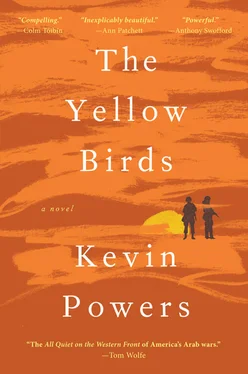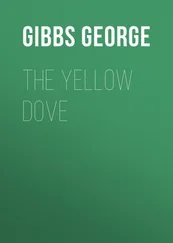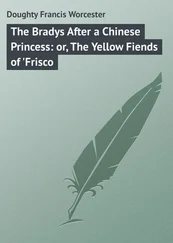“Where is that, Sarge?” I asked.
“Murph is home, Bartle. And he’s gonna be there with a flag shoved up his ass before you know it.”
I walked off, intending to look for Murph, when Sterling called after me. “There’s only one way home for real, Private. You’ve got to stay deviant in this motherfucker.”
In a way, I knew it was true. Over the next few days Murph came to embody an opacity I couldn’t penetrate further. I had my own speculations. On our days off I gave myself free rein to explore them. I talked to myself in bunkers at the few rarely traveled edges of our FOB, fueled by cheap Jordanian whiskey. My mutterings in the dark were punctuated by short percussive sobs. I was becoming spectral, too. An afterthought. I began to visualize my own death in those raw, purposeless tubes of concrete between which I wandered in the evenings. If someone could have seen me, if I could have been seen, then I might have looked like I’d been hurtled into my future, huddling under roofs of an urban landscape just below street level. My mutterings would not seem uncharacteristic, but rather inevitable, and the passing men and women would not pay me much attention. They might in their passing talk say, “What a shame he couldn’t get it back together.” And one might answer, “I know, so tragic.” But I would not embrace their pity. I might be numb with cold, but I would not ask for understanding. No, I would only sit muttering with envy for their broad umbrellas, their dryness, and the sweet, unwounded banality of their lives. But it would not matter. Couldn’t, because the rain would still fall on the alleys and culverts where I’d rest. It would fall at the edges of parking decks where one might remain for a night or two before discovery. It would fall in the city parks where the leaves or bare branches would conspire with a cardboard sign to keep me dry, all legibility bled away from the pathetic messages I’d written on it. It would fall the way it fell in Al Tafar, soft and intermittently over the war, the rain’s stops and starts becoming nothing more than weathered sighs of resignation.
When I imagined my death that night, sitting in a bunker at the eastern edge of the FOB, I imagined all of its possible permutations. I sipped from a bottle of Royal Horse and gazed out through the round entrance of the bunker, an aperture through which I could see the buildings and minarets tinged in purple and black by each variety of night passing through the hours. I imagined it all, the first wound coming soon, in fall or what would pass for winter, likely to be cold, apt to be. I’d bleed, to be sure, if I were not also concussed, boxed on the ears, and de- and re-pressurized in an instant. I would bleed. I’ll bleed. I spoke out loud, slurring the words slightly, my voice echoing with a dull reverberation in the concrete tube. Murph would find my body, but first I had to become a body, so that there would be something to be shot, but more likely there would be an explosion, more likely there would be metal made into sheets with jagged edges folded over into my skin and my skin would be torn. And as confusion always seems to follow blasts, I would be left to bleed until my face became gray and my skin all over became gray and thus would I become a body. I said “gray” and “body” and my quiet vowels echoed out the ends of the short tube and I’d be dead and A and O sounds trickled into the night, into the slight rain, and I saw Murph. I was drunk. I saw Murph cradling my head, its new concavity, saw him drag me by my arms. My legs, limp and dead, dragged sputteringly along the ground, where they bounced at slight shifts in elevation, but I didn’t notice them as they were dragged behind my body. I laughed and the soft expulsive H made no echo and I saw water and my body floating, my blood in it, and I thought I smelled my blood, my body, a ripe metallic. I was so drunk. I saw inside dark boxes, cheap tin caskets and Virginia and all the little graves lined up like teeth in the field and the dogwoods blooming and then the falling petals and my mother crying, she was crying. I made her cry. I saw the solidity of the earth, the worms, the flag and the tin box fading away and I saw brown earth forever and I thought of Murph and water and I mouthed the word “water” in a questioning tone and that is all I remembered before I woke up, all except the syllabic echo of my voice against the concrete going “qua, qua, qua.”
The rain stopped. The weather mellowed. Our next forty-eight-hour rotation on patrol was uneventful. We were unaware of even our own savagery now: the beatings and the kicked dogs, the searches and the sheer brutality of our presence. Each action was a page in an exercise book performed by rote. I didn’t care.
I hadn’t talked to Murph in days. No one had. I found the remnants of his casualty feeder card and the letter and picture from his ex-girlfriend in a laundry bucket, soap and all. I put them in my pocket. I started tailing him, trying to figure out what he was up to. I didn’t want to believe that I was watching the actions of someone who was already dead, so I searched for evidence that would contradict this; I searched for some grasp, at least, at life.
I began to find his mark all over the FOB: Murph was here. A little tag: two eyes and a nose peering over one thin line. Sometimes the fingers over the wall as well, sometimes not, but always the eyes and nose, ridiculous and searching, and the tag, Murph was here. I considered the possibility that he had been doing this all tour. There were never any dates, at least not on the half dozen or so I found, but I didn’t believe that any of them were older than a week or so. I attempted to triangulate his whereabouts from those half-dozen tags, narrowing down the places he could be one by one. Over the next few weeks I tried a stakeout on the DFAC, a transportation company, distant guard towers, even the hajji market that the brigade colonel had allowed to be set up on post so that we could further assist the native population by participating in their local black market economies. I couldn’t find him anywhere.
Out of ideas, I asked around. “Anybody know where Murph’s been off to?”
“Naw, man,” they’d say.
“How the fuck would I know?” said others.
I ran into Sterling, his feet resting on a short stack of sandbags, a porno mag shading his eyes from the dulled sun. “Hey, Sarge, you seen Murph around lately?”
“Yeah,” he said. “He’s been going up to the medics’ station and eyeballing some bitch up there.”
“At headquarters?” I asked.
“No, dummy,” he replied. “He’s eyeballing our medic, fat-ass Smitty.”
“Oh, right. I’m going to head up there and see what he’s up to.”
“Your war today, Private,” Sergeant Sterling said, and I headed out of our area, ducking under the netting stretched from bunker to bunker and from connex to connex. I used my hands to keep the sagging fabric from falling over me like a shroud. Thin light rippled down through the voids and fell onto my hands and my body and fell onto the dusty track toward the little hill where the HQ medics’ unit was quartered.
I chain-smoked my way up the base of the hill. A small clapboard chapel stood in the packed dust that stretched out over the majority of the base. The white painted boards were chipped and peeling from the abrasive wind, and a few trees rose out of their potting holes around its perimeter, not yet taken by the earth where they were planted for shade, then left to fend for themselves in the heat of summer. A helipad was roughly scoured out of the dirt at the top of the hill. Behind it a series of tents and exhumed concrete culverts sat in a sectioned maze. A low stone wall surrounded the entirety of the small compound, snaking along the crest of the hill like an unwound ribbon of decalcified bone, seeming on the verge of collapsing back into the earth from which the stones were taken.
Читать дальше












